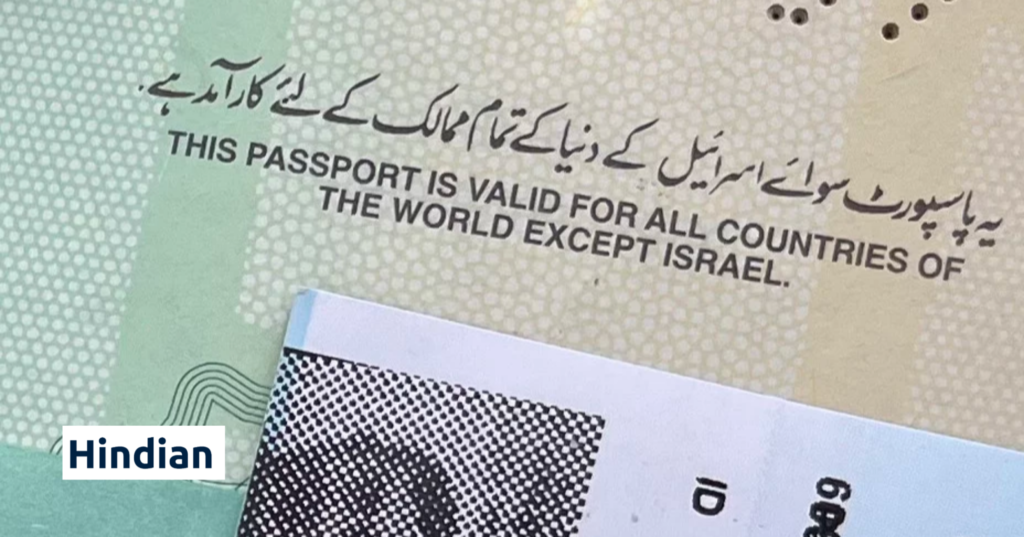Many Muslim-majority nations portray their diplomatic hostility toward Israel—through bans on Israeli passport holders or by marking passports as “not valid for travel to Israel”—as symbolic victories for the Palestinian cause. However, beneath these actions lies a tapestry of contradictions, selective outrage, and religious-political hypocrisy. These are not acts of moral righteousness but ideological grandstanding that ignore broader injustices and reflect deep-seated biases.
Selective Outrage and Diplomatic Hypocrisy
If moral clarity truly guided these nations, their outrage would not be so narrowly focused on Israel. Consider China, which has subjected millions of Uyghur Muslims to surveillance, forced labor, and cultural erasure. Not a single Muslim country has dared to bar Chinese passport holders or sever diplomatic ties with Beijing. Likewise, Russia’s invasion of Ukraine has not prompted the same intensity of condemnation.
Moreover, countries like Pakistan and Saudi Arabia, while refusing to recognize Israel, engage in trade, arms deals, and diplomacy with regimes far more brutal. The hypocrisy is not only glaring but deeply disingenuous.
Double Standards in Human Rights Discourse
Many of these nations decry Israel for its treatment of Palestinians while simultaneously oppressing their own populations. Saudi Arabia, Iran, and Qatar offer minimal civil liberties, restrict religious freedom, and harshly punish dissent. In Lebanon and Syria, Palestinian refugees are denied basic rights and citizenship. Yet these issues are ignored to preserve a singular narrative that places all blame on Israel.
While Israel is labeled as an apartheid state, the real apartheid systems operating under Islamic rule—where minorities are second-class citizens or worse—go unchallenged.
Religious Supremacy Disguised as Political Resistance
Refusing to recognize Israel or permit travel there is not merely political; it is theological. For many of these nations, the core issue is not borders but belief—the refusal to accept the legitimacy of a non-Muslim state in what they consider Islamic land. This is not diplomacy; it is religious supremacism cloaked in political rhetoric.
These same nations were silent during Jordan’s and Egypt’s historical control over Palestinian territories. Their outrage only emerges when a Jewish state asserts its sovereignty.
Economic Hypocrisy and Backchannel Deals
While publicly condemning Israel, many Muslim countries engage in covert cooperation. They:
- Import Israeli agricultural and medical technology through third parties.
- Secretly engage in backchannel diplomacy, especially following the Abraham Accords.
- Accept U.S. military and financial aid, much of which bolsters Israeli defense indirectly.
The duplicity is clear: public hostility for populist appeal, private pragmatism for national interest.
Obsession with Israel, Silence on Intra-Muslim Atrocities
The Muslim world’s obsessive focus on Israel masks a glaring silence on the millions of Muslims killed in intra-Islamic conflicts. From Yemen and Syria to Sudan and Iraq, sectarian violence continues unabated. These crises receive a fraction of the outrage directed at Israel, revealing the disproportionate and performative nature of their diplomatic stance.
Pakistan: A Case Study in Absurdity
No discussion on performative hypocrisy is complete without highlighting Pakistan’s self-inflicted delusions. A country drowning in foreign debt, dependent on IMF bailouts, and teetering on the edge of economic collapse, Pakistan bizarrely celebrates its ban on Israeli passports as a diplomatic triumph. This is a nation whose own passport ranks among the weakest globally, declaring itself victorious by barring entry to Israelis who would never dream of visiting it in the first place.
Meanwhile, Pakistan battles internal radicalism, military dominance over civilian rule, and daily sectarian strife. Instead of addressing its crumbling infrastructure or failing institutions, it seeks relevance by issuing bold statements against Israel—a country that has no diplomatic ties, no historical threat, and no real interaction with Pakistan. If this is what counts as foreign policy achievement, Pakistan has reduced statecraft to schoolyard theatrics.
Final Reflection
In barring Israeli citizens and denying Israel’s legitimacy, Muslim nations cloak theological rigidity in the language of diplomacy. These actions do not uplift the Palestinian cause but reveal a pattern of religious intolerance, selective morality, and political posturing. True justice and peace will never emerge from dogma-driven policies or performative outrage. If these nations are to command respect on the global stage, they must confront their own contradictions, uphold universal values, and abandon the duplicity that currently defines their foreign policy.



